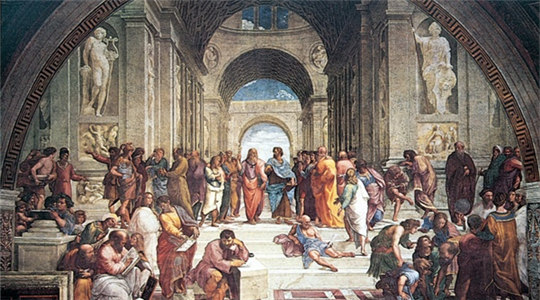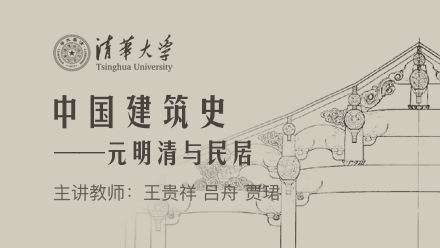
当前课程知识点:Plato, Socrates, and the Birth of Western Philosophy > Seeking “zhi”(知)——the Ancient Epistemology > 5.Epistemology(4) > Epistemology(4)
返回《Plato, Socrates, and the Birth of Western Philosophy》慕课在线视频课程列表
返回《Plato, Socrates, and the Birth of Western Philosophy》慕课在线视频列表
讲了这些 我们再来看
奥古斯丁的直接地对知识论问题
做过哪些研究 得出过哪些结论
奥古斯丁在考虑知识问题的时候
他首先是做一个非常宽泛的理解
他是联系到另外一个词
联系到智慧来谈论这个问题的
他说智慧 这个sophia
是关于人的和神的事情的知识
读了奥古斯丁的这些论述 我感到
奥古斯丁在这里想要努力地建立
信仰与知识的联系
奥古斯丁本人对这个问题的解释
也成为后来的哲学家们
在思考这个问题的一种代表性的观点
奥古斯丁也像柏拉图 西塞罗一样
大量地研究了知识的来源问题
研究了获得知识的两条道路的问题
在这个方面 奥古斯丁的独特的贡献
就是他的所谓的内感觉的学说
奥古斯丁他不否认
感觉 感性知识是一个知识的来源
但是他认为 感觉有两种
一种感觉就是其它哲学家谈论最多的
人通过各种感官获得的知识
获得的感觉
这种知识就被称为感性知识
奥古斯丁对于这种感性知识的可靠性
是非常非常怀疑的
他在很多地方都举了大量的例子
指出 人的感性知识是不可靠的
比如他说 你远远地看去有一座塔
你以为那座塔只有六个面
但是等你走进以后你会发现
这个塔实际有更多的面
他还举例说 你们都划过船
你们都知道 这个划船的桨它是直的
但是它要是插入水中
它就变成弯的了
所以这个桨到底是直的还是弯的
你光靠感官能够确定吗 不能确定
所以奥古斯丁在思考了
感性知识的可靠性问题以后
他提出 人除了眼睛 鼻子 舌头
这么一些感官以外
人还有一些内感官
这个内感官就是人们所谓的
内感觉的来源
说到内感官 这个问题呢比较复杂
我再做一些解释
人们通常所说的感官
我们都知道它的含义
而人们一说内心的内部的感官
这个问题就复杂了
在柏拉图那里 人们认识世界
可以用他的眼睛 鼻子 感官去把握
另外柏拉图也指出
人实际上有另外一种感官
这个感官就是心灵
心灵就是灵魂的眼睛
奥古斯丁在思考这个问题的时候
他在前面 跟柏拉图有点相似
他感到 这些通过感官获得的知识
是不可靠的
那么如果我们走到这一步
再进而推而广之
认为人的所有知识 一切知识都不可靠
那不就成了怀疑论者了吗
所以奥古斯丁又努力地去思考
人除了感官 除了这些感性知识
还有没有获得可靠知识的这种感官
有没有可靠的知识
奥古斯丁经过长期思考以后
他认为尽管我们不知道
这个感官到底长得什么样
但是人的灵魂人的心灵
一定有一种和感官相似的功能
能够帮助我们获得可靠的确定的知识
所以后来他就在知识论问题上
提出了一个内感觉的一个概念
他说这种内感觉是由我们内心产生的
它来自于我们的灵魂
这种内感官获得的知识是可靠的
它不像那种感性知识一样
经常在变化 变动不居
所以奥古斯丁的这种内感觉这种学说
到了近代的时候
被许多近代思想家所接纳
发展出人的所谓的内省式的认识道路
后来的一些西方近代哲学家
吸取了奥古斯丁的内感觉学说
把人的认识道路 认识来源的问题
做了更加充分的解释
奥古斯丁的知识论
还有一个非常重要的特色
这就是他在他那个时代
说出了这样一些话
他说我怀疑 所以我存在
与这样的话类似的还有
他说我在思考 所以我存在
他甚至还说 我爱故我在
我们看 这么一些论述
我们如果把它概括起来
那么它实际上是在这里
做出这么一个理性的证明
他想要证明 人这个认识的主体
到底是存在的还是不存在的
但是用什么方式去证明呢
他用他的内感觉来证明
他的内感觉是通过他的思考
也通过他的活动 可以加以说明的
我思 我怀疑
这些东西都是一些
在我们今天看来
都是一些理性思考的问题
但是这个理性思考
却能够拿来证明
这个认识主体的存在
这在哲学上就涉及到一个重大的问题
思维与存在的关系问题
奥古斯丁的这个思想一经提出
对后世哲学产生了巨大影响
我举一个例子来说明
我们知道
笛卡尔是西方近代哲学的创始人之一
笛卡尔曾经说过一句名言
我思故我在
笛卡尔提出这个理论以后
很多人 后来的学者都在查考
他在提出这个著名论断的时候
有没有借鉴别人的思想
笛卡尔的朋友问他
你的这个思想是你完全独创的吗
笛卡尔说 那当然这是我的思想
但是当后人读到了早在笛卡尔之前
一千年左右的这个奥古斯丁
在他的著作中间
已经表达了相类似的一些判断
人们由不住就产生了一种怀疑
认为笛卡尔在提出他的哲学论断的时候
借鉴了奥古斯丁的思想
不同的思想家在相对独立的地区
提出相类似的思想 是可能的
如果笛卡尔在提出
他的著名论断的时候
确实没有借鉴或参考过
奥古斯丁的观点
那么笛卡尔
当时在回答他朋友的提问的时候
他说的是实话
我们把处在不同时代的
这些哲学家的哲学思考
不把它看做是割裂的分离的
我们把它看做是连续的
是层层递进的
任何一位哲学家在创造
他自己的思想的时候
都会借鉴他的前人
他的前辈的思想
所以我们如果把西方哲学的思想的发展
看做是连续的
那么我们至少可以说
奥古斯丁的思想
是笛卡尔的思想的前奏
我们刚才分析了柏拉图
西塞罗 奥古斯丁的知识论思想
-1.Etymology
-2.Definition and the History of Philosophy
--Definition and the History of Philosophy
-3.Religion
--Religion
-4.Culture
--Culture
-5.Theory of Cultural Transformation and Interaction: Five theoretical premise
--Theory of Cultural Transformation and Interaction: Five theoretical premise
-6.Theory of Cultural Transformation and Interaction:Five Basic Position
--Theory of Cultural Transformation and Interaction:Five Basic Position
-7.The Significance of Theory of Cultural Transformation and Interaction
--The Significance of Theory of Cultural Transformation and Interaction
-Self-test Exercises
-Thinking Questions
-1.The Birth Environment of the Greek Philosophy(1)
--The Birth Environment of the Greek Philosophy(1)
-2.The Birth Environment of Greek Philosophy(2)
--The Birth Environment of Greek Philosophy(2)
-3.The Stages and Schools of Greek Philosophy(1)
--The Stages and Schools of Greek Philosophy(1)
-4.The Stages and Schools of Greek Philosophy(2)
--The Stages and Schools of Greek Philosophy(2)
-5.The Local Characteristics of Ancient Greek Philosophy and the progress of internationalization(1)
--The Local Characteristics of Ancient Greek Philosophy and the progress of internationalization(1)
-6.The Local Characteristics of Ancient Greek Philosophy and the progress of internationalization(1)
--The Local Characteristics of Ancient Greek Philosophy and the progress of internationalization(1)
-7.The termination of Ancient Greek Philosophy
--The termination of Ancient Greek Philosophy
-Self-test Excercises
-Thinking Questions
-1.A transition to rational thinking(1)
--A transition to rational thinking(1)
-2.A transition to rational thinking(2)
--A transition to rational thinking(2)
-3.A transition to rational thinking(3)
--A transition to rational thinking(3)
-4.A transition to rational thinking(4)
--A transition to rational thinking(4)
-5.Heraclitus’ thinking
-6.Parmenides’ thinking(1)
-7.Parmenides’ thinking(2)
-Self-test Excercises
-Thinking Questions
-1.Seeking the origin:the early philosophers(1)
--Seeking the origin:the early philosophers(1)
-2.Seeking the origin:the early philosophers(2)
--Seeking the origin:the early philosophers(2)
-3.Seeking the essence: Plato’s theory of Form (1)
--Seeking the essence: Plato’s theory of Form (1)
-4.Seeking the essence: Plato’s theory of Form (2)
--Seeking the essence: Plato’s theory of Form (2)
-5.Seeking to on: Aristotle’s ontology and metaphysics (1)
--Seeking to on: Aristotle’s ontology and metaphysics (1)
-6.Seeking to on: Aristotle’s ontology and metaphysics (2)
--Seeking to on: Aristotle’s ontology and metaphysics (2)
-Self-test Excercises
-Thinking Questions
-1.The lexical meaning
-2.Epistemology(1)
-3.Epistemology(2)
-4.Epistemology(3)
-5.Epistemology(4)
-6.The features
-Self-test Excercises
-Thinking Questions
-1.A lexical meaning(1)
-2.A lexical meaning(2)
-3.A lexical meaning(3)
-4.Plato’s Dialectics(authentic true)
--Plato’s Dialectics(authentic true)
-5.Aristotle’s Logics(judging true)(1)
--Aristotle’s Logics(judging true)(1)
-6.Aristotle’s Logics(judging true)(2)
--Aristotle’s Logics(judging true)(2)
-Self-test Excercises
-Thinking Questions
-1.A lexical meaning
-2.The occurrence and development of the ancient Greek Science(1)
--The occurrence and development of the ancient Greek Science(1)
-3.The occurrence and development of the ancient Greek Science(2)
--The occurrence and development of the ancient Greek Science(2)
-4.The occurrence and development of the ancient Greek Science(3)
--The occurrence and development of the ancient Greek Science(3)
-5.The occurrence and development of the ancient Greek Science(4)
--The occurrence and development of the ancient Greek Science(4)
-6.The occurrence and development of the ancient Greek Science(5)
--The occurrence and development of the ancient Greek Science(5)
-7.the technicalization and application of ancient Greek Science(1)
--the technicalization and application of ancient Greek Science(1)
-8.the technicalization and application of ancient Greek Science(2)
--the technicalization and application of ancient Greek Science(2)
-Self-test Excercises
-Thinking Questions
-1.A Lexical meaning
-2.Plato’s theory of Love
-3.The high praise to the love god: a reading on Symposium (1)
--The high praise to the love god: a reading on Symposium (1)
-4.The high praise to the love god: a reading on Symposium (2)
--The high praise to the love god: a reading on Symposium (2)
-5.The high praise to the love god: a reading on Symposium (3)
--The high praise to the love god: a reading on Symposium (3)
-6.The high praise to the love god: a reading on Symposium (4)
--The high praise to the love god: a reading on Symposium (4)
-Self-test Excercises
-Thinking Questions
-1.A lexical analysis
-2.The development of the Classic Greek Ethics(1)
--The development of the Classic Greek Ethics(1)
-3.The development of the Classic Greek Ethics(2)
--The development of the Classic Greek Ethics(2)
-4.The development of the Classic Greek Ethics(3)
--The development of the Classic Greek Ethics(3)
-5.The development of the Classic Greek Ethics(4)
--The development of the Classic Greek Ethics(4)
-6.From the ultimate goodness to the common goodness(1)
--VideoFrom the ultimate goodness to the common goodness(1)
-7.From the ultimate goodness to the common goodness(2)
--From the ultimate goodness to the common goodness(2)
-Self-test Excercises
-Thinking Questions
-1.A lexical meaning
-2.Ancient humanistic trend of thoughts(1)
--Ancient humanistic trend of thoughts(1)
-3.Ancient humanistic trend of thoughts(2)
--Ancient humanistic trend of thoughts(2)
-4.Ancient humanistic trend of thoughts(3)
--Ancient humanistic trend of thoughts(3)
-5.A theoretical summary
-Self-test Excercises
-Thinking Questions
-1.A lexical analysis
-2.The story of Gyges
-3.The Ancient theory of justice(1)
--The Ancient theory of justice(1)
-4.The Ancient theory of justice(2)
--The Ancient theory of justice(2)
-4.The Ancient theory of justice(3)
--The Ancient theory of justice(3)
-Self-test Excercises
-Thinking Questions
-1.An explanation to the related words
--An explanation to the related words
-2.A Platonic Republic
-3.Cicero’s people’s Republic(1)
--Cicero’s people’s Republic(1)
-4.Cicero’s people’s Republic(2)
--Cicero’s people’s Republic(2)
-Self-test Excercises
-Thinking Questions
-1.A lexical analysis
-2.The religious trends in the late period of ancient Greek philosophy(1)
--The religious trends in the late period of ancient Greek philosophy(1)
-3.The religious trends in the late period of ancient Greek philosophy(2)
--The religious trends in the late period of ancient Greek philosophy(2)
-4.The religious trends in the late period of ancient Greek philosophy(3)
--The religious trends in the late period of ancient Greek philosophy(3)
-5.The religious trends in the late period of ancient Greek philosophy(4)
--The religious trends in the late period of ancient Greek philosophy(4)
-6.The collision between faith and reason(1)
--The collision between faith and reason(1)
-7.The collision between faith and reason(2)
--The collision between faith and reason(2)
-Self-test Excercises
-Thinking Questions
-1.An explanation to the related words
--An explanation to the related words
-2.Communion with gods(1)
-3.Communion with gods(2)
-4.Communion with gods(3)
-5.Communion with gods(4)
-6.Plotinus’ mystical system of thoughts
--Plotinus’ mystical system of thoughts
-Self-test Excercises
-Thinking Questions
-1.The local characteristics of the ancient Greek Philosophy
--The local characteristics of the ancient Greek Philosophy
-2.The progressive universalization of the ancient Greek Philosophy
--The progressive universalization of the ancient Greek Philosophy
-3.The basic spirits of the ancient Greek Philosophy(1)
--The basic spirits of the ancient Greek Philosophy(1)
-4.The basic spirits of the ancient Greek Philosophy(2)
--The basic spirits of the ancient Greek Philosophy(2)
-Self-test Excercises
-Thinking Questions


